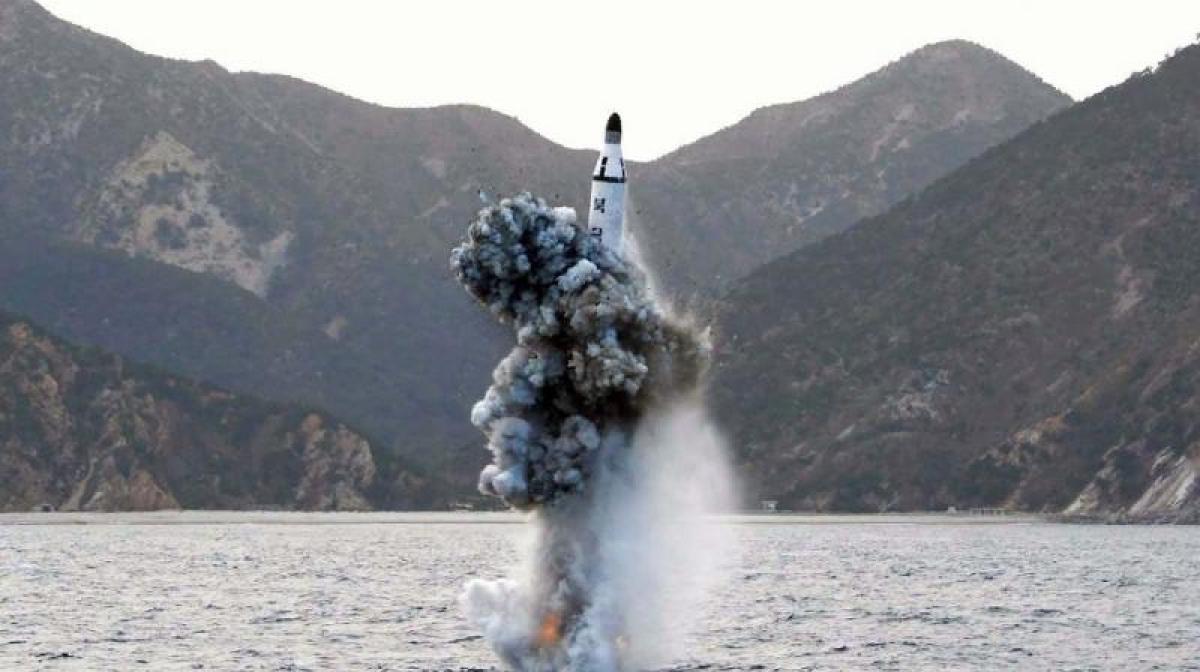Live
- Leaked! iPhone 17 Battery, Camera, Chipset, Design and Display Upgrades
- Kerala mulls increasing retirement age of govt employees to 57
- Credit, deposit growth now in line with each other in India: Report
- Very 'productive' meeting with PM Modi, says British PM Starmer
- Actor Satyadev in Bengaluru to promote Zebra movie
- Vijaya Chaitanya Palanki Leads the Development of Advanced Data Analytics Algorithms for Upsell Scoring, Churn Prediction, and Promotion Management
- Wanaparthy collector says Prajapalana Vijayotsava kaka yatra from 19 Nov to 7 Dec
- Hamas says security operation kills 20 aid truck looters
- Flipkart Mobiles Bonanza Sale: Top 5 Smartphone Deals with Great Discounts
- Supreme Court Issues Notices to YS Avinash Reddy in YS Viveka murder case
Just In

North Korea has carried out a successful ground test of a new high-power rocket engine, state media said Tuesday, in a development that could advance Pyongyang\'s weapons programme.
Seoul: North Korea has carried out a successful ground test of a new high-power rocket engine, state media said Tuesday, in a development that could advance Pyongyang's weapons programme.
After supervising the test at the country's Sohae satellite-launching site, leader Kim Jong-Un called on officials, scientists and technicians "to round off the preparations for launching the satellite as soon as possible", KCNA news agency reported.
There has been speculation that North Korea might celebrate the October 10 anniversary of the founding of the ruling Workers Party of Korea by launching a satellite.
Kim also called for more rocket launches to turn the country into a "possessor of geostationary satellites in a couple of years to come", according to KCNA.
North Korea has already carried out a series of long-range missile tests presented as satellite launches, most recently in February.
KCNA said the engine would give the country "sufficient carrier capability for launching various kinds of satellites, including Earth observation satellite at a world level".
Rocket scientist Chae Yeon-Seok at Korea Aerospace Research Institute said that with the new engine, the North is "coming close to having an inter-continental ballistic missile (ICBM) that could hit the US mainland".
"North Korea's space programme is focused on developing launch vehicles that can easily be used for missiles rather than developing decent satellites", Chae told AFP.
The engine test comes after the North claimed earlier this month that it had successfully tested a nuclear warhead that could be mounted on a missile and follows a series of ballistic missile launches.
The September 9 nuclear test was the North's fifth and most powerful yet at 10 kilotons, experts have said.
Pyongyang's state media said that test had realised the country's goal of being able to fit a miniaturised warhead on a rocket.
Missile Development
If Pyongyang can make a nuclear device small enough to fit on a rocket -- and bolster the range and accuracy of its missiles -- it might achieve its oft-stated aim of hitting US targets. But its past claims to have achieved this have been discounted.
Kim "expressed great satisfaction" with the results of the engine test, according to KCNA.
He said the North had made cutting-edge scientific advances "despite the difficult economic conditions of the country", the report said.
North Korea has been hit by five sets of United Nations sanctions since it first tested a nuclear device in 2006, but has insisted it will continue, come what may.
KCNA gave no date for the test but it is customary for state media to report Kim's activities with a day's lapse.
North Korea's nuclear programme has been accompanied by a series of ballistic missile launches, including from a submarine.
A proven submarine-launched ballistic missile system would allow deployment far beyond the Korean peninsula and a "second-strike" capability in the event of an attack on the North's military bases.
Professor Yang Moo-Jin of the University of North Korean Studies said the North had set a five-year space development programme that ends this year.
"This new test heralds an upcoming landmark ICBM test. The next test, disguised as a satellite launch, is likely to come when the UN Security Council adopts new sanctions over its last nuclear test or around the time when the US presidential election takes place in November", Yang said.
The United States has a range of missile-defence technologies at its disposal, including the Aegis Combat System, Patriot missiles and sophisticated radars.
Washington is also working with Seoul to install a missile defence system known as THAAD in South Korea, though the move has infuriated Beijing, which says the hardware poses a significant threat to regional security.

© 2024 Hyderabad Media House Limited/The Hans India. All rights reserved. Powered by hocalwire.com







